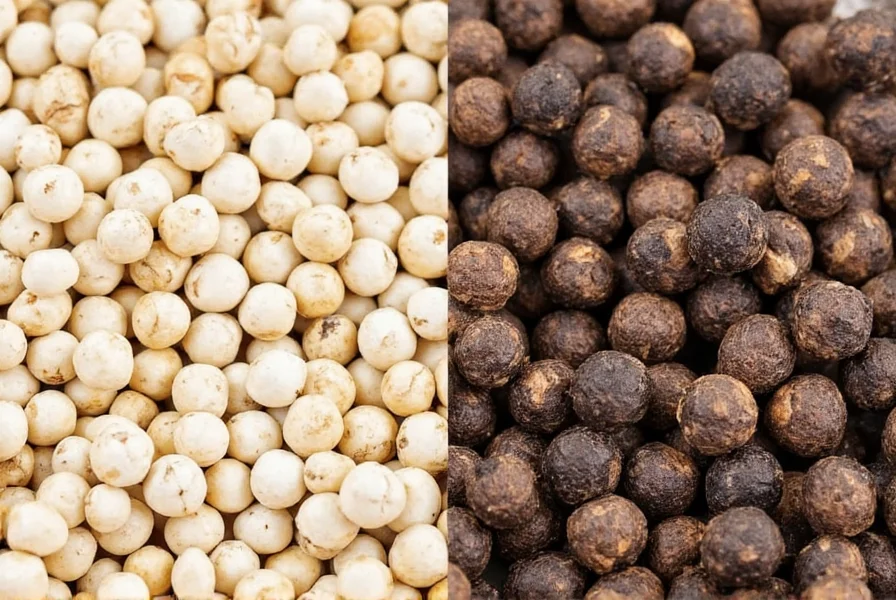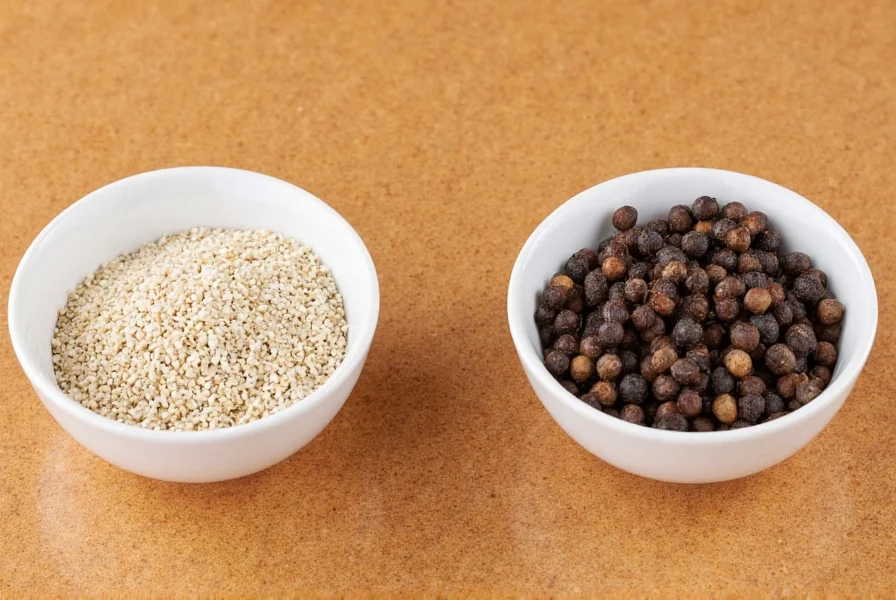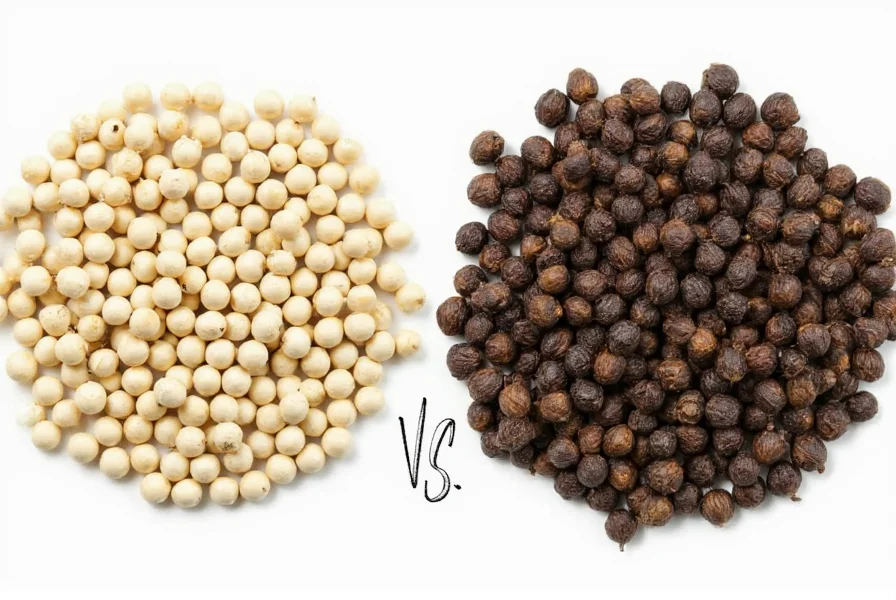The difference between white pepper and black pepper extends beyond color to fundamental processing methods that create distinct culinary profiles. Both originate from the Piper nigrum vine native to India's Malabar Coast, yet their transformation paths diverge significantly after harvest.
Botanical Origins and Harvesting Process
Understanding the white pepper vs black pepper distinction begins with harvesting practices. Black pepper comes from green, unripe peppercorns picked just before maturity. These small berries undergo sun-drying, causing their outer layer (pericarp) to shrivel and darken into the familiar black peppercorn.
White pepper requires a more complex process. Farmers allow peppercorns to fully ripen to red before harvesting. The berries then undergo one of two treatments: either soaking in water for 7-10 days to ferment and loosen the outer layer, or mechanical removal of the pericarp. What remains is the inner seed, which dries to the pale beige characteristic of white pepper.
| Characteristic | Black Pepper | White Pepper |
|---|---|---|
| Peppercorn Stage | Unripe (green) | Fully ripe (red) |
| Processing Method | Sun-dried with outer layer intact | Outer layer removed before drying |
| Flavor Profile | Bold, complex, piney, citrus notes | Milder, earthier, subtle heat |
| Heat Level | Medium-high (2,000-2,500 SHU) | Medium (1,500-2,000 SHU) |
| Common Culinary Uses | General seasoning, dark sauces, meats | Light-colored dishes, creamy sauces, Chinese cuisine |
| Shelf Life | 2-3 years | 1-2 years |
Flavor Chemistry and Sensory Differences
The white pepper vs black pepper taste difference stems from chemical composition. Black pepper contains piperine (providing heat) plus terpenes like limonene and pinene that create its complex aroma. The outer layer removed during white pepper production contains many of these volatile compounds.
When evaluating which pepper is hotter white or black, black pepper typically registers higher on the Scoville scale due to greater piperine concentration in the outer layer. However, white pepper's heat feels different—more direct and less complex, making it seem milder despite similar piperine levels in the seed itself.

Culinary Applications and When to Choose Each
Chefs select between these peppers based on specific culinary uses of white pepper versus black. Black pepper's robust flavor stands up well to hearty dishes like steaks, stews, and dark sauces. Its visible specks add visual interest to many preparations.
White pepper shines where visual presentation matters. In cream sauces, mashed potatoes, or light-colored soups, it provides seasoning without dark specks. Many Chinese and Vietnamese dishes traditionally use white pepper for its distinctive earthy notes. Understanding when to use white pepper instead of black pepper can elevate your cooking—choose white for subtle heat in delicate dishes, black for bold flavor statements.
Nutritional and Health Considerations
Both peppers offer similar nutritional profiles with minimal calories but contain piperine, which enhances nutrient absorption. Some studies suggest black pepper may have slightly higher antioxidant levels due to compounds in the outer layer. However, the health benefits of black pepper vs white pepper show negligible practical differences for typical culinary use.
Those with sensitive digestive systems sometimes find white pepper gentler, though scientific evidence remains limited. The fermentation process in white pepper production creates different microbial compounds that may affect digestion differently than black pepper.

Storage and Quality Considerations
Proper storage affects both varieties differently. Black pepper maintains freshness longer—up to three years when stored in airtight containers away from light. White pepper's reduced shelf life (typically 1-2 years) stems from its processing; without the protective outer layer, it loses volatile compounds more quickly.
When selecting either pepper, look for whole peppercorns rather than pre-ground. Grinding just before use preserves maximum flavor. High-quality black peppercorns should be uniform in size and dark color. Premium white pepper appears creamy white without yellowing, which indicates age or poor processing.
Practical Usage Recommendations
For home cooks navigating the pepper varieties comparison, consider these guidelines:
- Use black pepper for most general cooking applications where visual specks aren't problematic
- Choose white pepper for béchamel sauces, potato salads, or any light-colored dish where appearance matters
- Substitute white pepper in traditional Chinese recipes that call for it—the flavor profile differs significantly
- When substituting one for the other, use slightly less white pepper as its flavor concentrates differently
- Store both varieties in opaque, airtight containers away from heat sources
Addressing Common Misconceptions
Many believe white pepper is "stronger" than black, but this pepper varieties comparison myth likely stems from its more direct heat sensation. In reality, black pepper contains more total pungent compounds. Another misconception suggests white pepper is "purer"—both are equally pure forms of the same plant, just processed differently.
The notion that why white pepper is more expensive than black relates to rarity is also inaccurate. White pepper commands higher prices due to its labor-intensive processing, not scarcity. The fermentation or mechanical removal of the outer layer adds significant production costs compared to simple sun-drying for black pepper.
Conclusion: Making Informed Pepper Choices
Understanding the true differences between white and black pepper empowers better culinary decisions. Neither is objectively superior—they serve different purposes in the kitchen. Black pepper delivers complex, bold flavor ideal for most applications, while white pepper provides subtle seasoning for visually sensitive dishes. By recognizing their distinct processing methods, flavor profiles, and optimal uses, cooks can elevate their dishes with more thoughtful seasoning choices.
Frequently Asked Questions
Can I substitute white pepper for black pepper in recipes?
Yes, but with adjustments. Use about 25% less white pepper when substituting for black, as its flavor concentrates differently. Note that white pepper lacks the citrus and pine notes of black pepper, so the final dish will have a different flavor profile. It works best in light-colored dishes where black pepper specks would be undesirable.
Why do some recipes specifically call for white pepper?
Recipes specify white pepper primarily for visual reasons in light-colored dishes like cream sauces, mashed potatoes, or white soups where black specks would be unappealing. Certain culinary traditions, particularly in Chinese and Vietnamese cooking, also rely on white pepper's distinctive earthy flavor that differs from black pepper's more complex profile.
Which pepper has more health benefits?
Both contain piperine, which enhances nutrient absorption, but black pepper may have slightly higher antioxidant levels due to compounds in the outer layer that are removed during white pepper processing. However, the practical health differences for typical culinary use are negligible. Neither offers significant nutritional value by volume, but both contribute to the bioavailability of other nutrients in your meal.
Does white pepper really taste different from black pepper?
Yes, significantly. Black pepper has a complex flavor profile with pine, citrus, and floral notes alongside its heat. White pepper offers a more direct, earthy heat with fermented notes from its processing method. The difference is noticeable even to non-experts, which is why professional chefs select between them based on specific recipe requirements rather than using them interchangeably.
Why is white pepper more expensive than black pepper?
White pepper costs more due to its labor-intensive processing. The additional steps of allowing peppercorns to fully ripen, then fermenting or mechanically removing the outer layer, require more time and resources compared to the simpler sun-drying process for black pepper. This increased production complexity, not scarcity, accounts for the higher price of white pepper.











 浙公网安备
33010002000092号
浙公网安备
33010002000092号 浙B2-20120091-4
浙B2-20120091-4